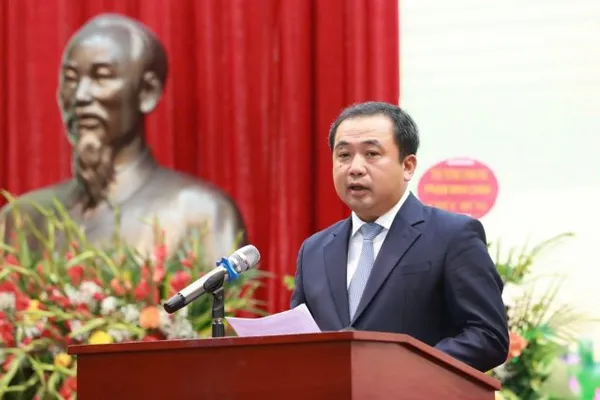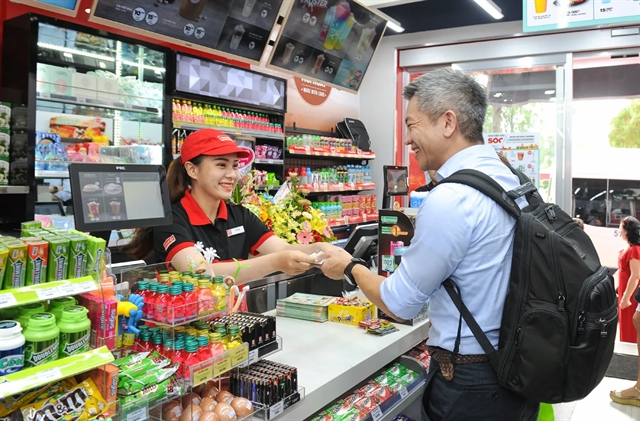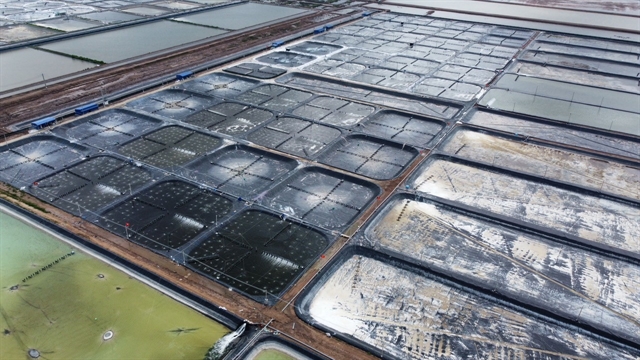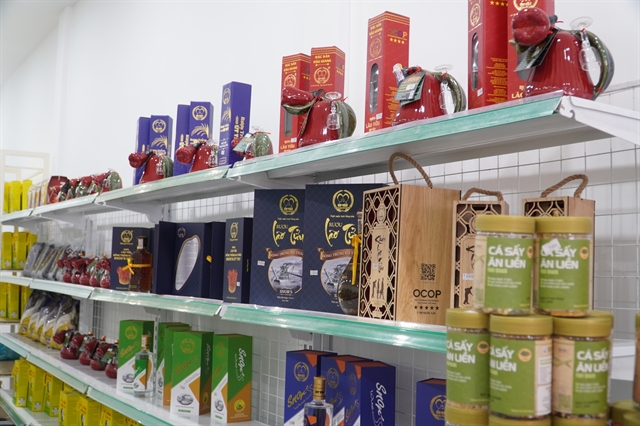 Society
Society
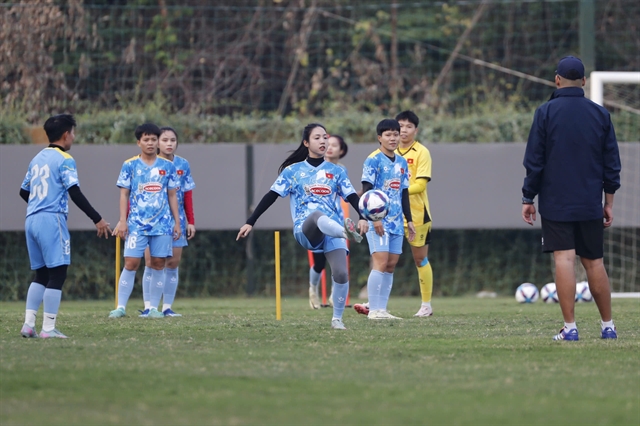
Minister of Health Nguyễn Thanh Long received questions and comments from National Assembly deputies on Wednesday morning, with concerns including the price of COVID-19 test kits, vaccine purchases and distribution, quarantine regulations and reopening of schools.
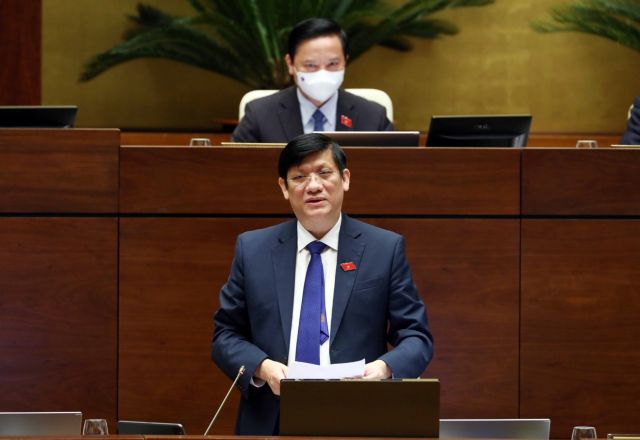
|
| Minister of Health Nguyễn Thanh Long at the Q&A session on Wednesday. VNA/VNS Photo Phạm Kiên |
HÀ NỘI — Việt Nam will implement booster shots by the end of this year, Minister of Health Nguyễn Thanh Long told the National Assembly on Wednesday.
He was answering questions from National Assembly deputies in a Q&A session, with concerns including the price of COVID-19 test kits, vaccine purchases and distribution, quarantine regulations and reopening of schools.
According to Long, Việt Nam has negotiated for 200 million doses of vaccines and the number can increase, while it is probable that a domestically developed vaccine will be licensed.
In response to a question from deputy Phạm Thị Thanh Mai about human and material losses that could have been avoided if vaccine strategies had been deployed earlier, Minister of Health Nguyễn Thanh Long said there are both internal and external factors leading to the fact that Việt Nam bought vaccines later than many countries, though it had access to vaccines quite early.
Starting from September 2020, Việt Nam worked on agreements with COVAX. In November 2020, the country had an agreement with Astra Zeneca to access 30 million doses of vaccine. Earlier, in May 2020, the ministry met with companies to push the production of domestic vaccines, Long said.
However, there are many external factors leading to the late purchase. They include global vaccine shortages in the last two years, the inequality in vaccine supply as some countries ordered four times more than their demand, the minister said. Other factors also include the vaccine hesitancy in Việt Nam and the world in early 2021. Việt Nam also faced difficulties with several legal barriers when negotiating and purchasing vaccines from abroad.
"The Ministry of Health takes responsibility for this issue and has worked to ensure sufficient vaccines for 2021 and 2022," he said.
In response to a question from deputy Đặng Hồng Sỹ from the central coastal province of Bình Thuận regarding the import of testing kits while Việt Nam has produced and exported this product since 2020, Minister of Health Nguyễn Thanh Long said Việt Nam has promoted and supported domestic production of testing kits.
“Currently there are two local producers of antigen testing kits and two others for antibody testing kits. The goal is to be autonomous in testing kit supply,” said Long.
Sỹ also asked about the principle of vaccine distribution as many people over 18 years old haven’t been vaccinated while many others have been inoculated with two and even three doses or even children have been vaccinated.
Long said the priority for vaccine is given based on risk assessment and population groups. They include provinces and cities at high risk or places with dense populations.
The health ministry has closely collaborated with localities in distributing vaccines, he said.
In October, vaccines were administered to people over 65, and in November, for people over 50 as they are the two groups at highest risk.
In early November, the health ministry implemented vaccinations for children from 12-17 in some key localities. The third dose will be administered starting from December 2021.
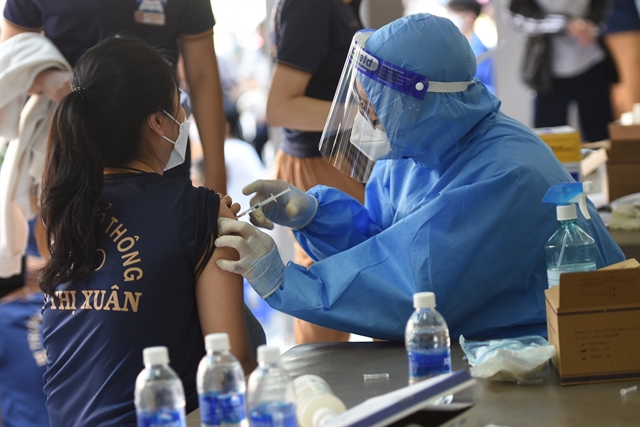
|
| A high school student in Biên Hòa City, Đồng Nai Province receives a vaccine dose. VNA/VNS Photo Công Phong |
Minister Long said predicting the COVID-19 situation is a tough issue and most countries in the world haven’t made long-term forecasts, some only develop short-term forecasts due to the appearance of variants.
He acknowledged the limitations in Việt Nam, saying that the forecast in some localities hasn’t been precise or matched reality.
He also raised concerns about the upcoming Tết (Lunar New Year) holiday with many activities and large crowds. He noted that localities must increase vaccination rates to reduce infections and deaths.
Seven-day quarantine for fully vaccinated people
Deputy Nguyễn Mạnh Cường from the central province of Quảng Bình raised concerns of residents about the requirement to have all F1s (those who have been in contact with infected people) quarantine for 14 days in concentrated facilities without considering specific cases.
Noting specific cases living in apartment buildings, he said, fully vaccinated people who comply with the 5K message still have to quarantine for 14 days even if they are in contact with F0 (infected case) for just a few seconds in the elevator.
Health minister Long acknowledged that this problem occurred in some localities including Hà Nội.
“We have discussed with Hà Nội and concluded that for those cases, they are not required to quarantine in concentrated facility for 14 days and are subject to seven-day quarantine at home only. The health ministry’s guidelines have clear regulations regarding this issue,” he said.
The minister also requested localities to comply with the ministry’s guidelines which have specific regulations for those who are fully vaccinated, those inoculated with one dose, unvaccinated people, and those recovering from COVID-19.
Reopening schools in low risk areas
Raising concerns about prolonged online learning, deputy Nguyễn Thị Thủy said in some provinces, parents are allowed to go to work but children still have to study online.
She said this is considered to be an “overcautious” move which didn’t take into account the disadvantages for children and difficulties facing families which have small children studying at home.
Long said the health ministry and ministry of education and training have hosted a conference with provinces and cities to ensure the localities are not too cautious in reopening schools for children, especially for first grade pupils.
He also instructed localities to have pandemic prevention and control measures to ensure safety when they reopen schools.
Localities shouldn’t wait for vaccines to reopen schools because only children over 12 will be vaccinated and the risk for children aged 6-11 is not high.
“We recommend localities reopen schools for students, especially in places at Level 1 and Level 2,” said Long.
Under the Government's Resolution 128/NQ-CP, the four levels of pandemic risk are as follows: Level 1: low-risk (new normal) – labelled green; Level 2: medium-risk – labelled yellow; Level 3: high-risk – labelled orange and Level 4: very high-risk – labelled red.
The resolution outlined that cities and provinces at Level 1 (low risk) can allow students to return to school and localities at Level 3 (high risk) can combine online and in-person learning, Long said.
Enhancing human resources
Regarding the lack of high quality human resources in the health sector raised by deputy Nguyễn Thị Việt Nga, health minister Long said the ministry has worked to ensure sufficient supply of medical staff, and ensure Việt Nam catches up with the international medical sector.
Solutions to attract human resources to the public health sector have been deployed including raising allowances. Though there is shift of staff from the public to private health sector in certain places, human resources in the public sector is still the key and highly qualified staff still work in public health establishments, Long said.
He said the ministry will continue to train human resources, implement more incentives to attract medical officers to work in public health establishments, as well as propose revising the salary to retain doctors. — VNS

